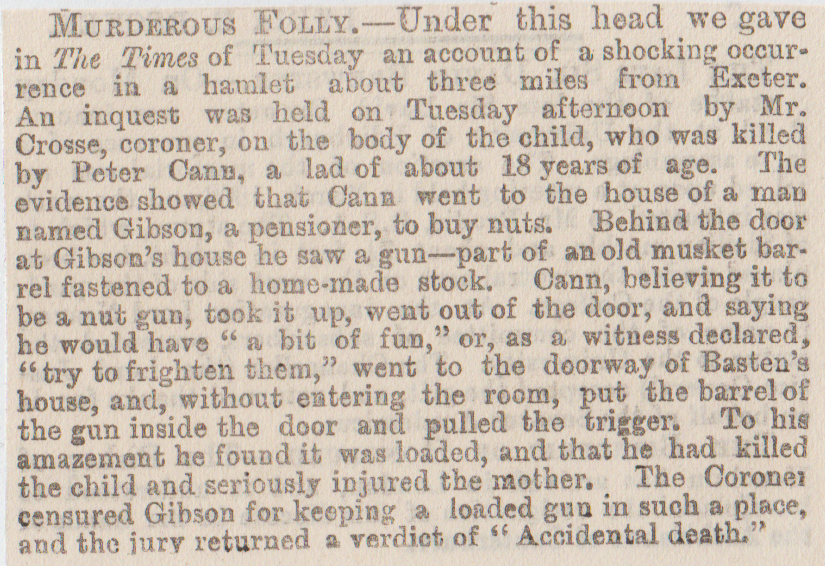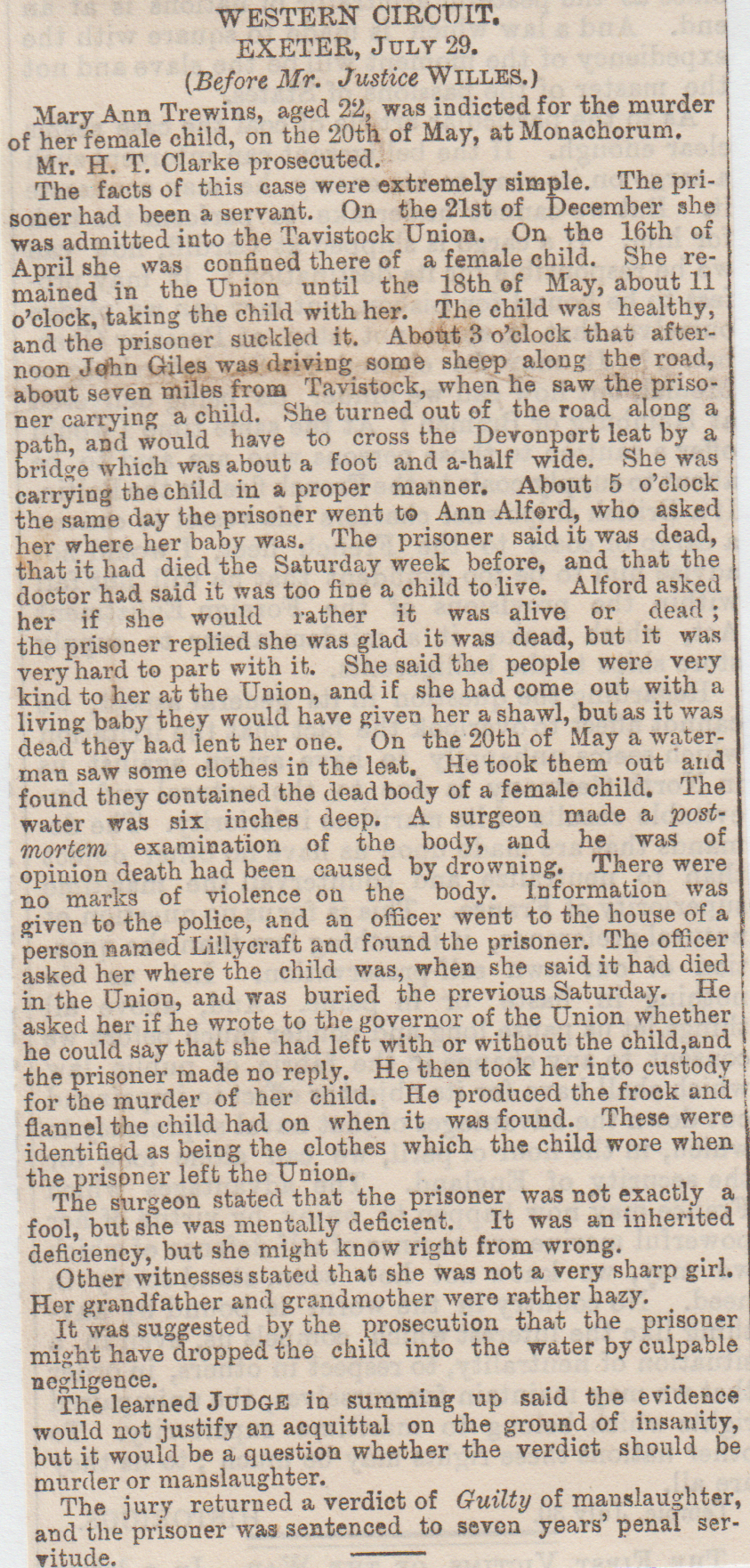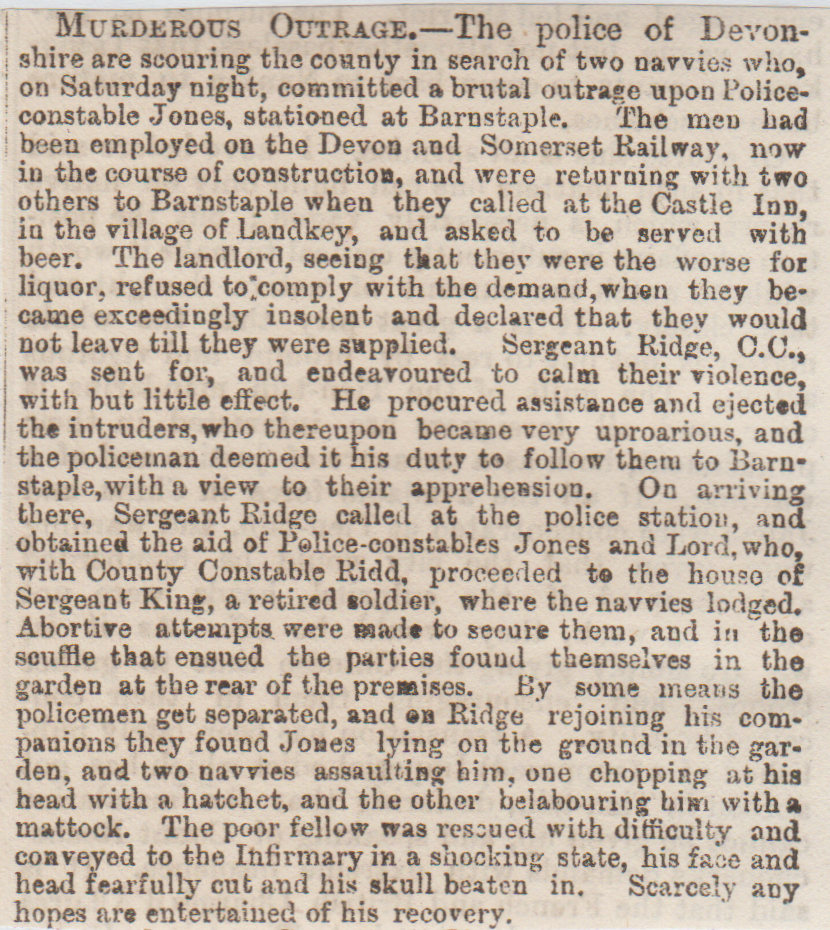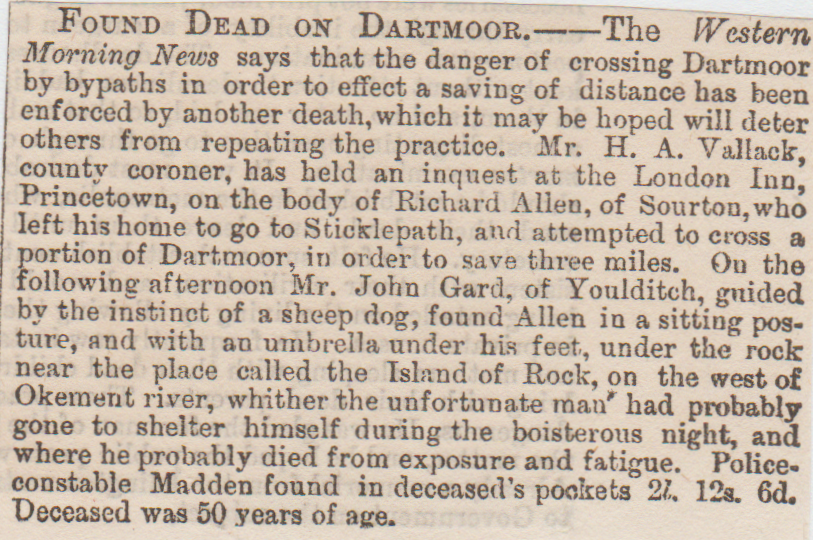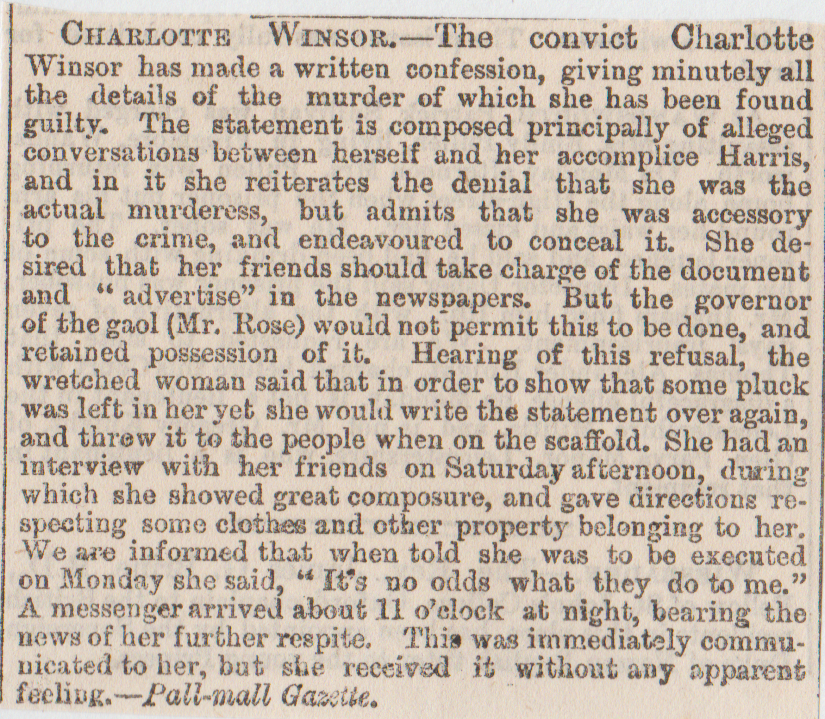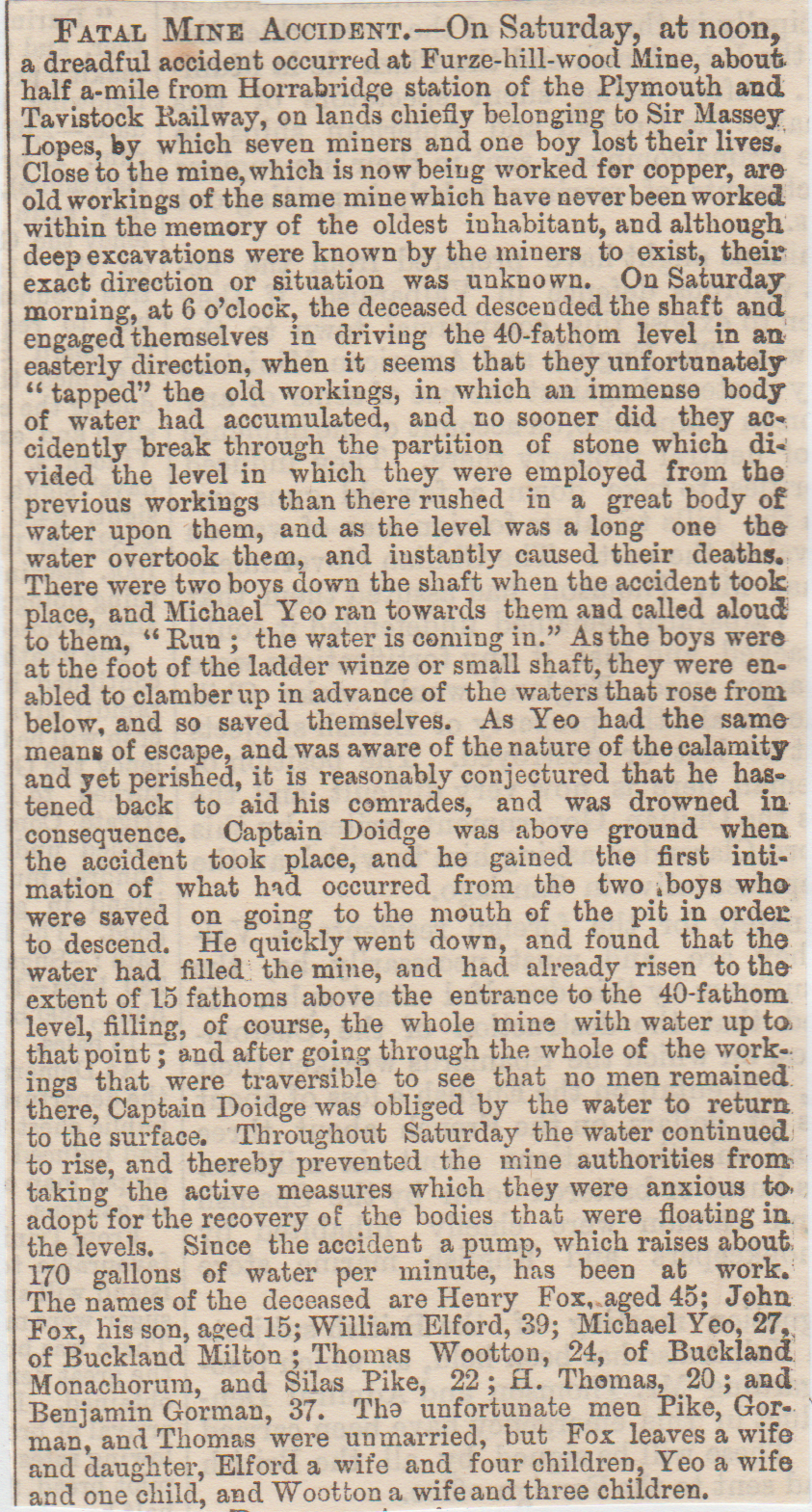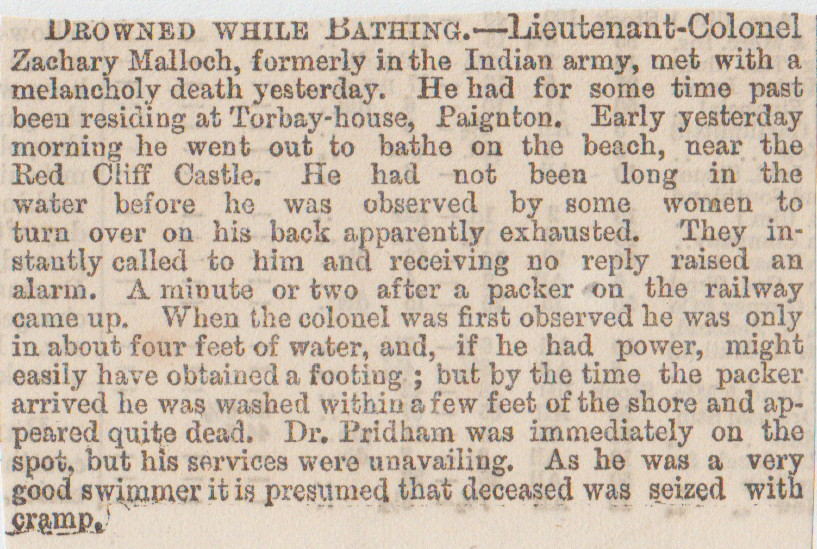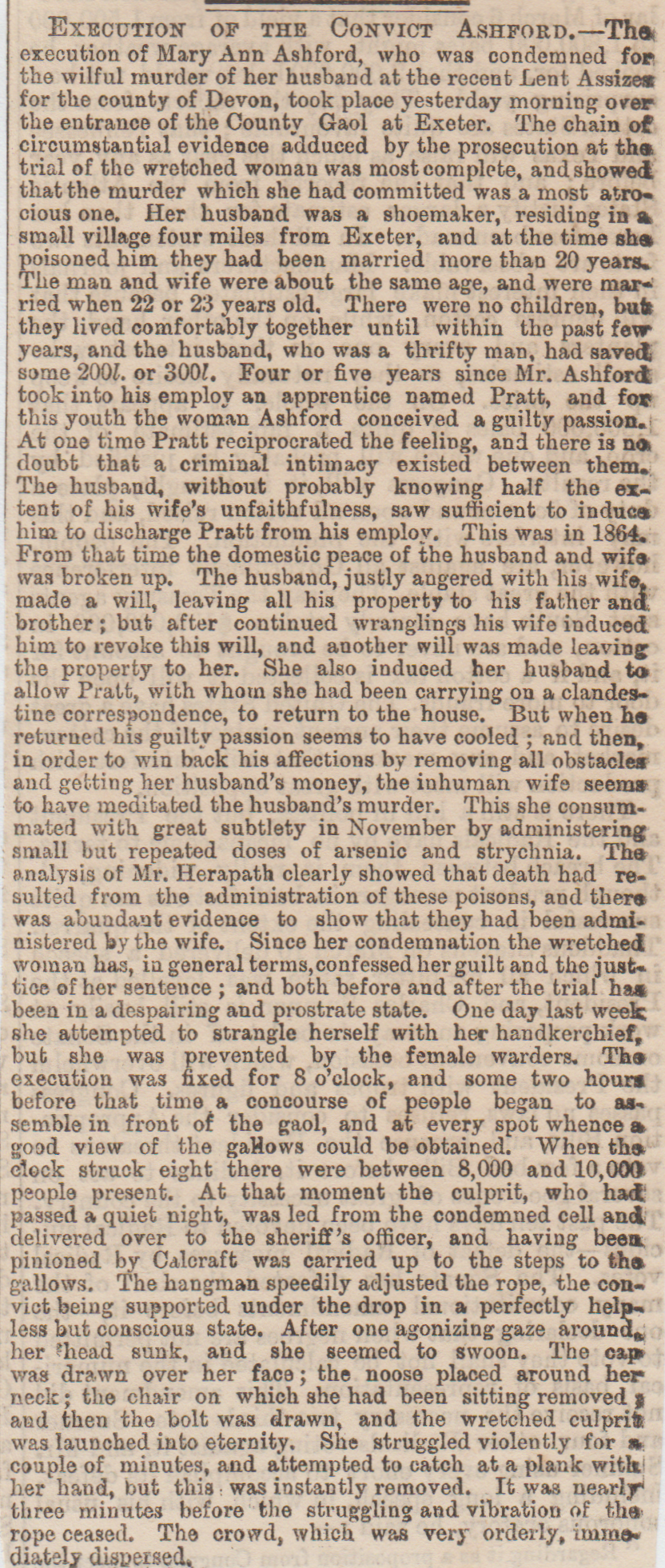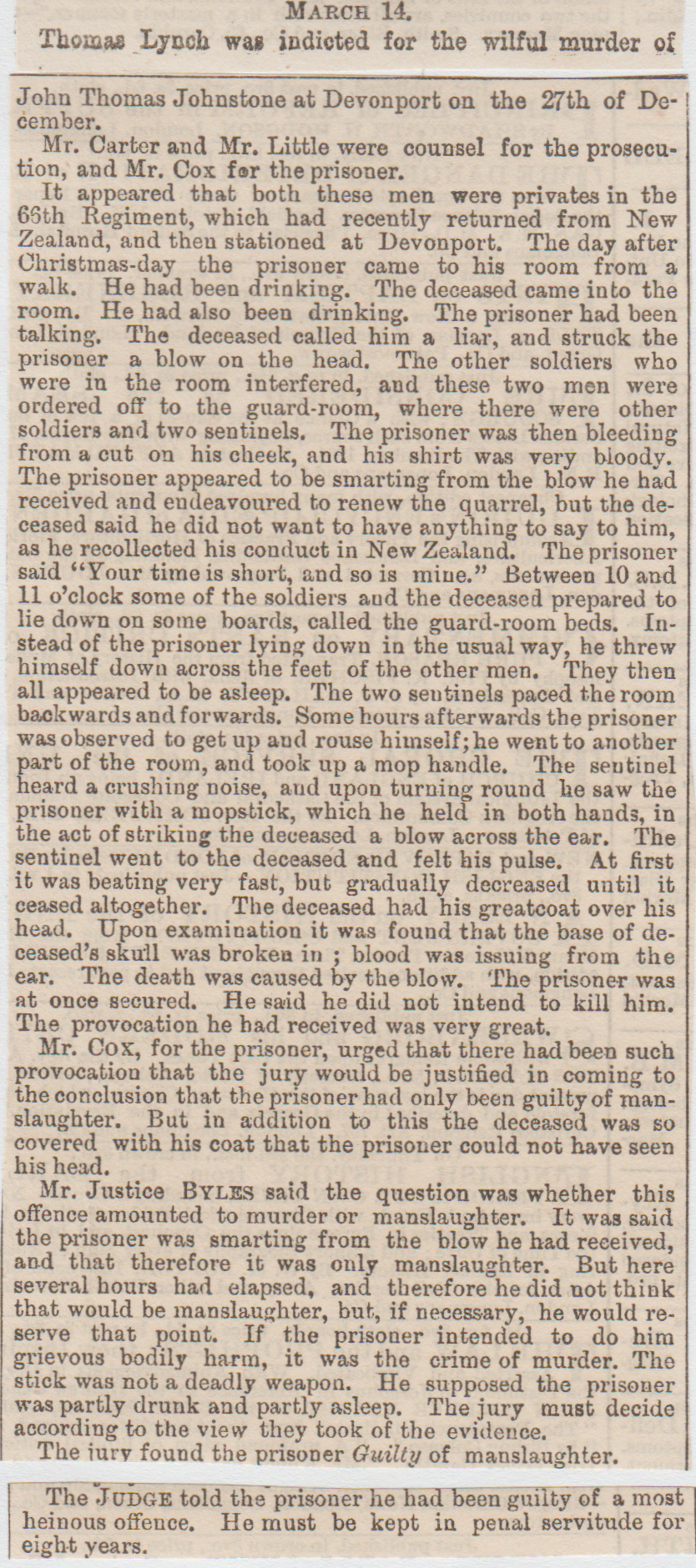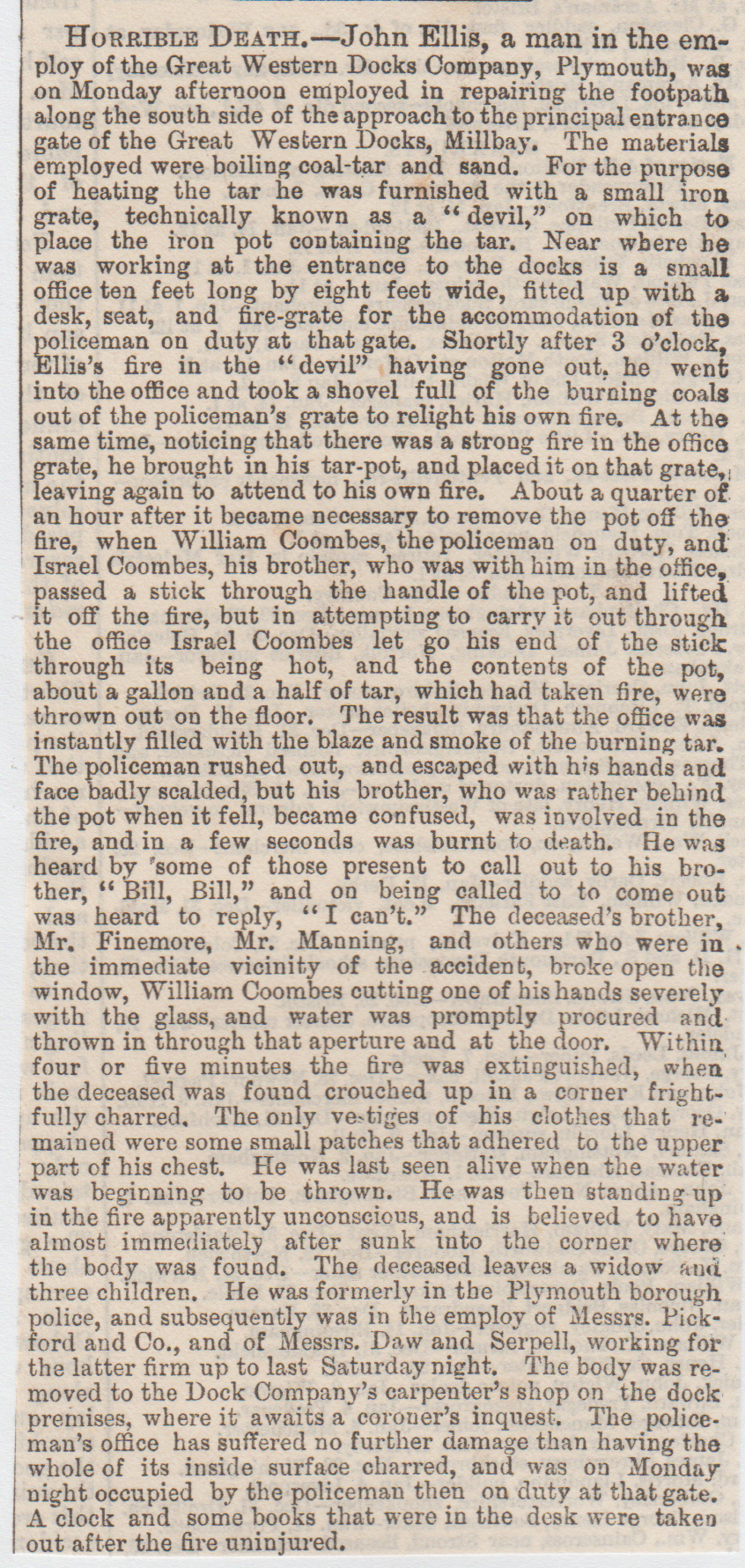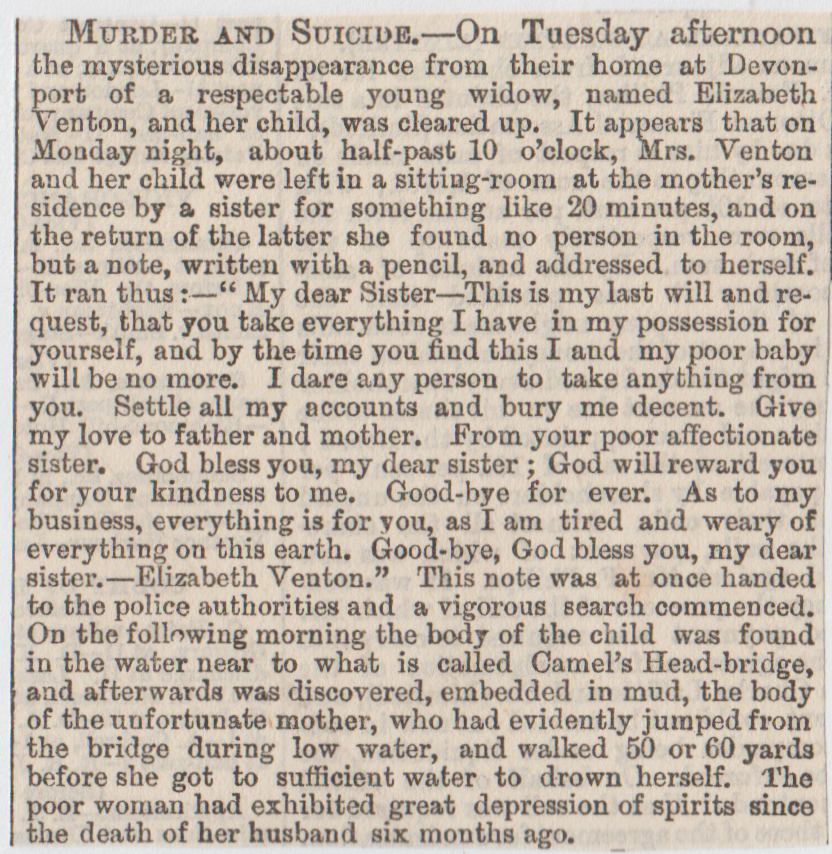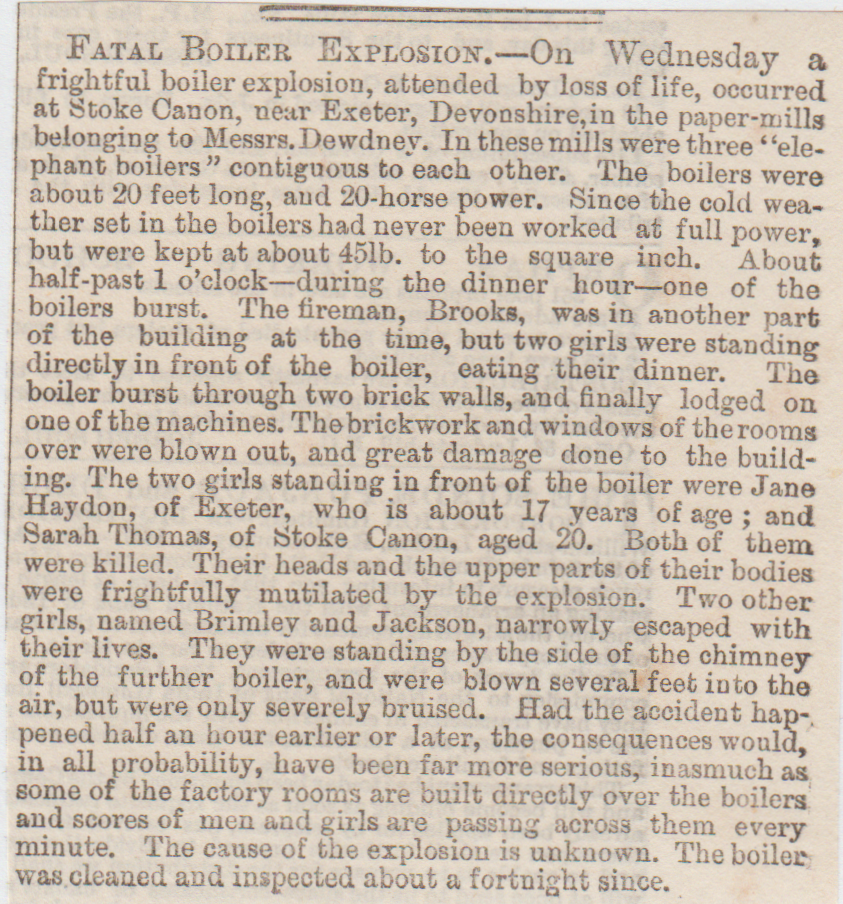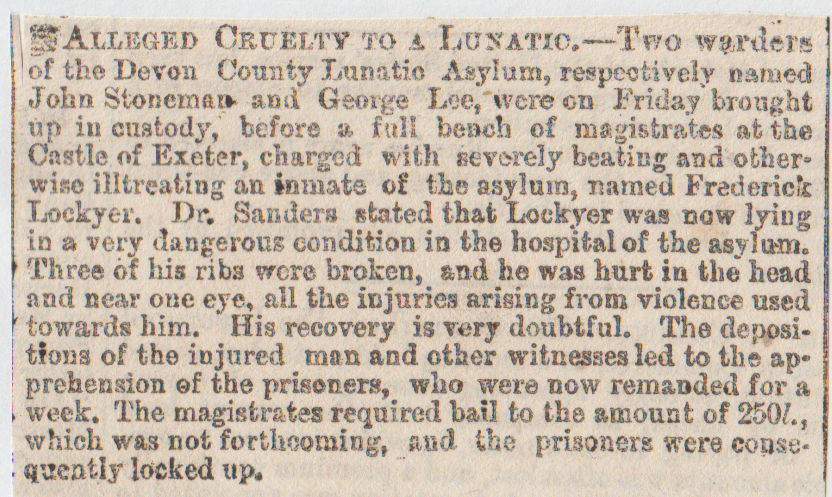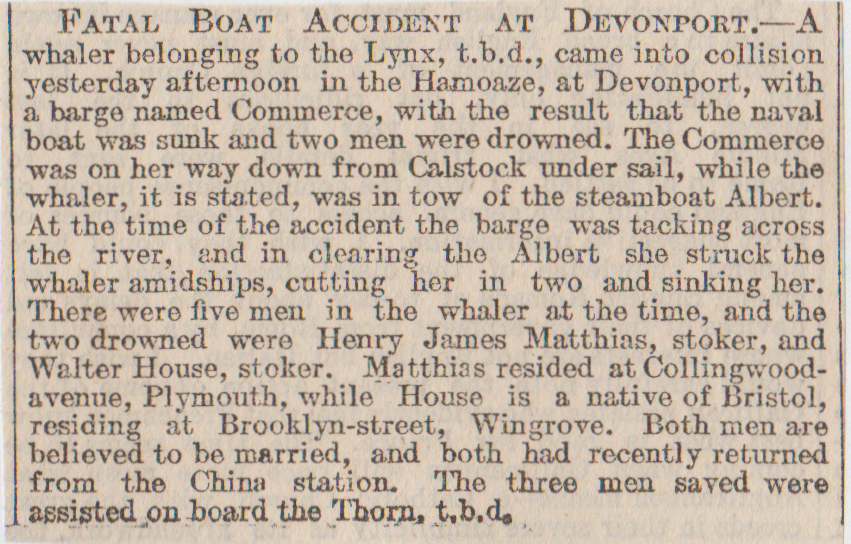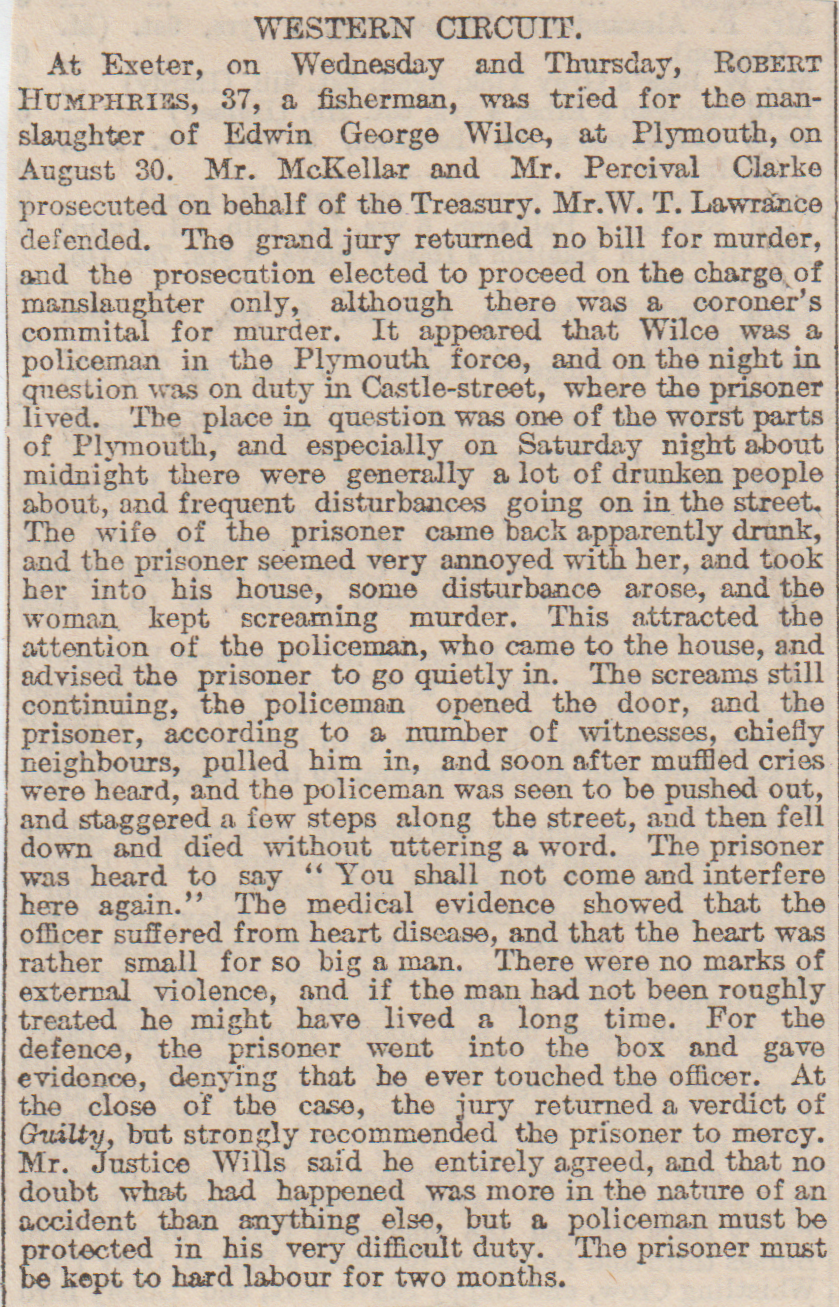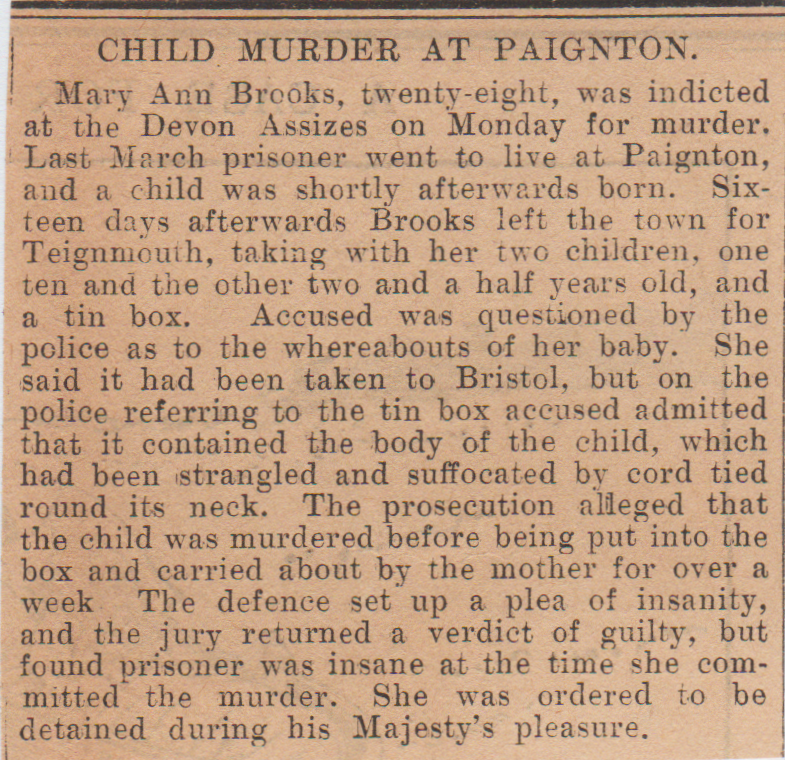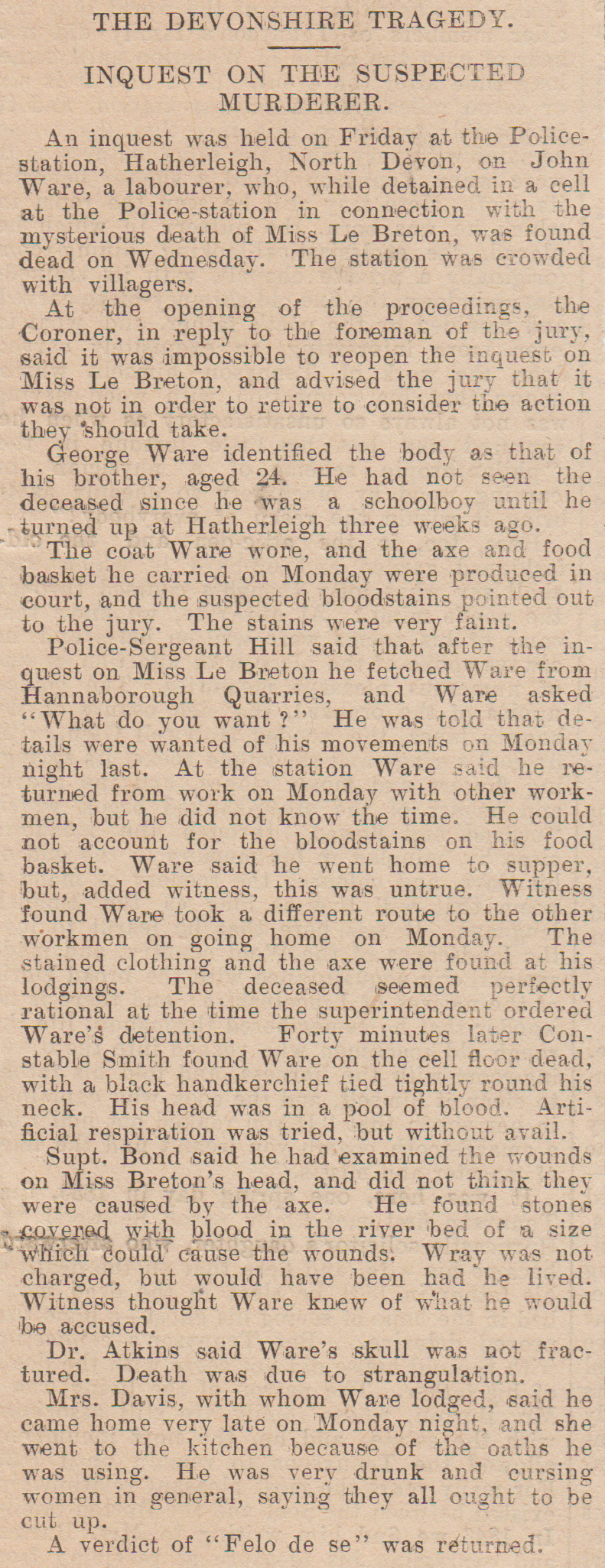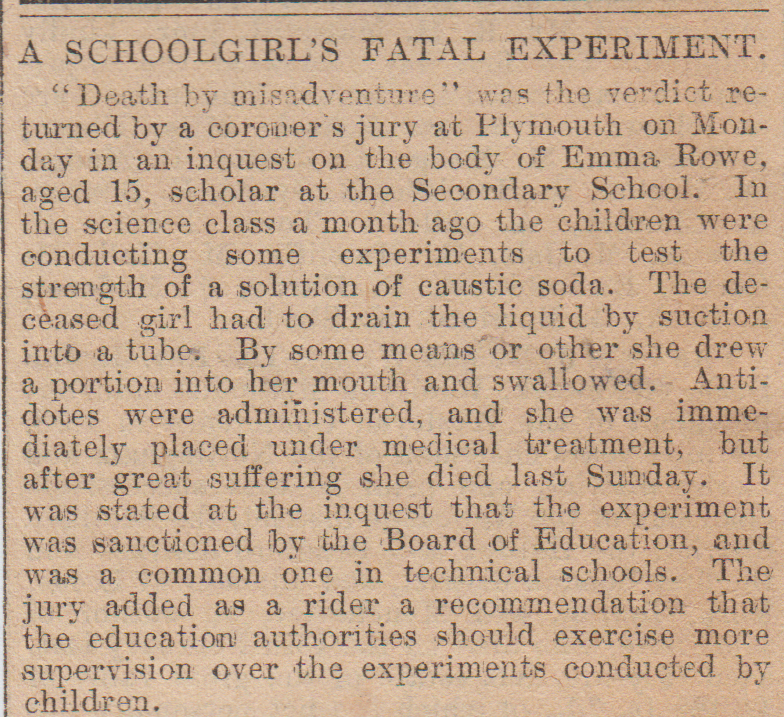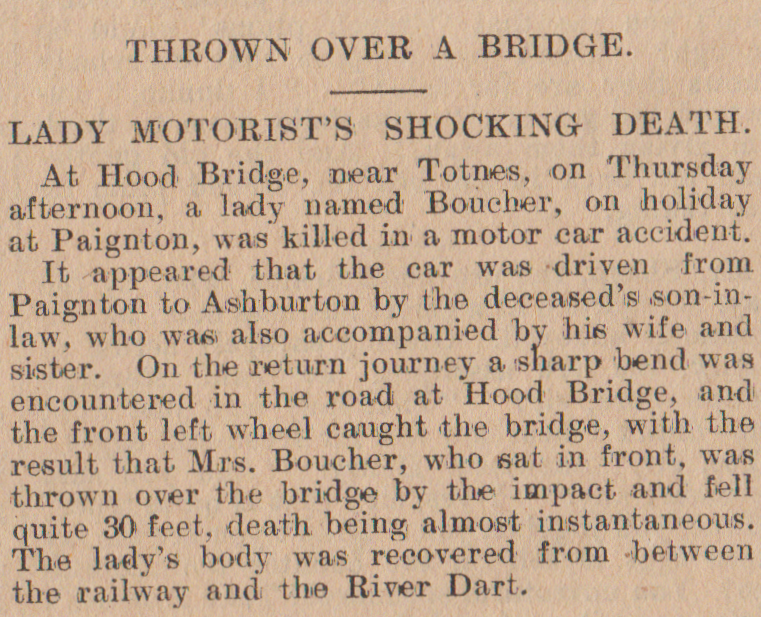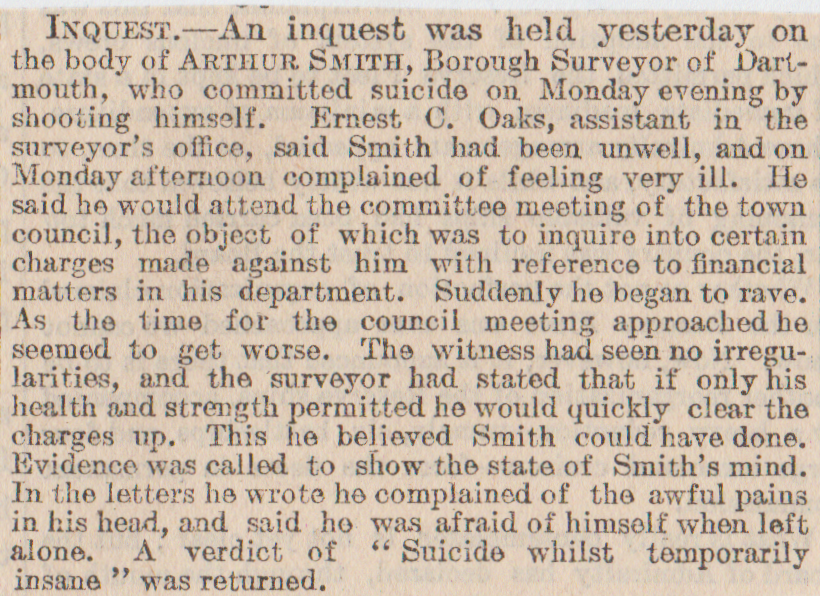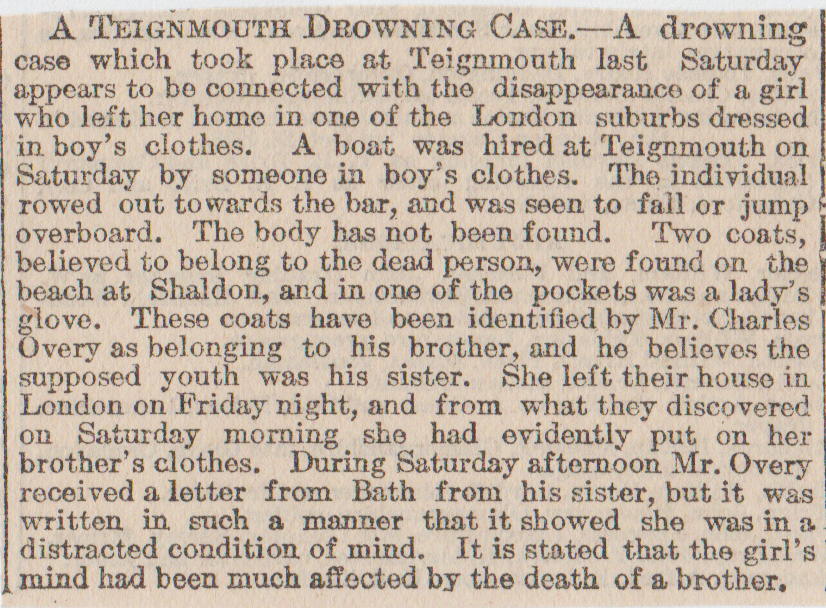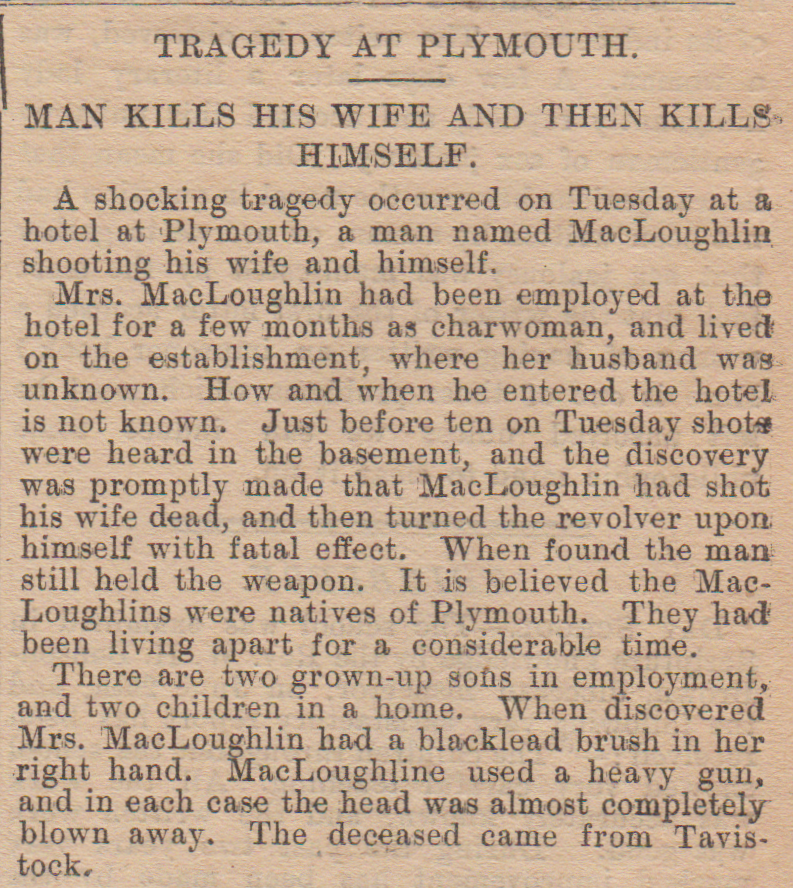1/ St Marychurch Churchyard Suicide, Torquay, January 1890
A postman named Searle was taking a short-cut through the church-yard of St Marychurch and came across the body of a man hanging from a tree. He fainted, but when he woke, he managed to get help. It turns out to be an ex- coachman turned coffee-tavern manager by the name of Brewer.
2/ Devonport Suicide, November 1893
Twenty-eight-year-old Amos Trout was found on the workshop floor of the premises where he worked, with a gunshot wound on his left side. He had constructed a home-made gun by putting a piece of gas pipe in a vice, plugged one end and then drilled a touch-hole then placed in gunpowder. Trout then placed a home-made bullet in it and fired the projectile.
3/ Torquay Church Death, November 1875
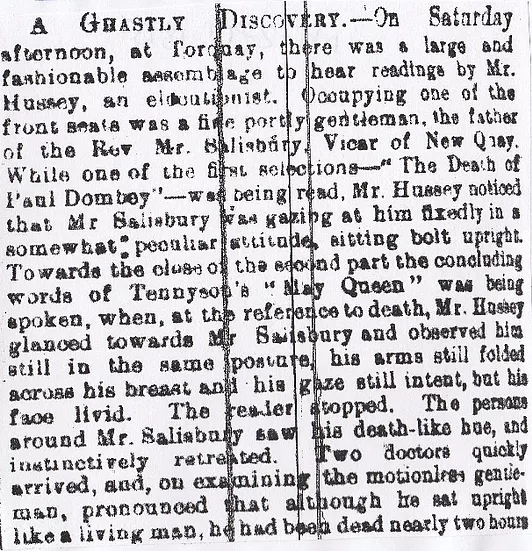
4/ Bideford, (Skeletons Found), November 1884
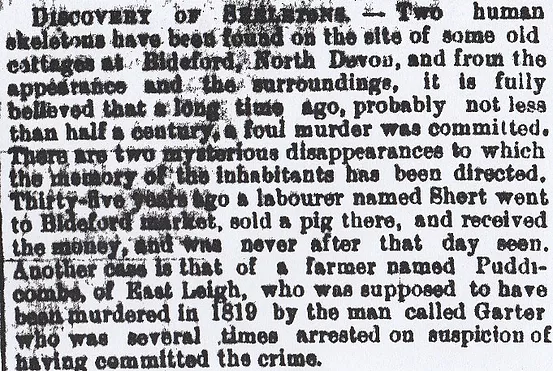
5/ Ottery St Mary, October 1846 (Double Suicide)
Mary Olderidge, aged twenty-six and Jane Smith were chatted up by a bloke, and Olderidge tried to get half a crown to get some booze with. The man on finding out he’d been scammed, said he would go to their employer if he didn’t get it back. They went and bought threepence worth of arsenic, then went back to work. They finished their shift later that night and went straight to the pub where they drank a cider and poison cocktail. Both women died in agony, Olderidge a few days after taking it and Smith a day later. A verdict of “Felo de Se”, or suicide to you and me. Both of them were buried at midnight with no Christian rites in the church burial ground.
6/ Barnstaple, April 1889 (Tannery Fatality)
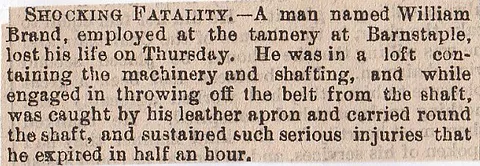
7/ Exmouth Fatal Fire, August 1889
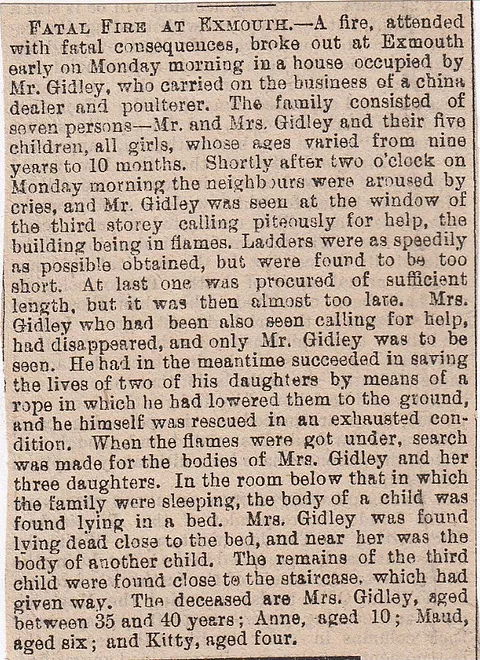
8/ Devonport Officer Suicide, March 1892
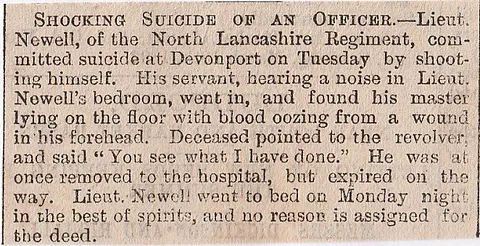
9/ Ilfracombe Regatta Fatal Accident, August 1889
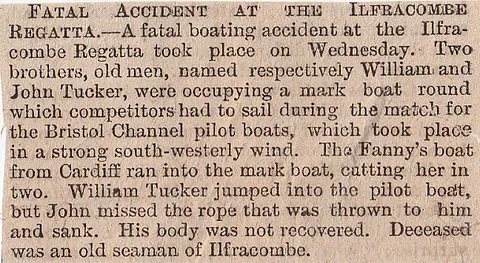
10/ Ilfracombe, June 1899 (Message in a Bottle)
One summer’s day a coffee canister attached to a bit of cork was found washed up by a boy near Ilfracombe. Inside was a note that read: “To my wife & children- The Stella is going down as I pen my last words. If I do not survive, go to my brother. Goodbye, my loved ones, goodbye. R.NEEL, A.B. to Mrs Abigail Neel, 5 High Street, Cardiff” – It was written in pencil on a page torn from a diary. When inquiries were made at 5 High Street, Cardiff, it appeared that nobody had any relatives or friends associated with the Stella. (Cruel Hoax?)
11/ Devonport, April 1861 (Murder Confession)
Currently, on board H.M.S.Impregnable at Devonport, is one Charles Davies, a Welshman, twenty-eight years of age who was brought from Rio de Janeiro by H.M.S.Buzzard, where he’d been serving as a seaman on board H.M.S.Madagascar, entering that ship from a merchant vessel while in Rio. He tells a tale that the captain and mate on the merchant ship liked him, but the rest of the crew despised him and plotted to throw him overboard. When on the Madagascar something forced him to tell them that a few months before, while in Wales he murdered a girl and even told where the body was. The man was useless on board ship due to his hallucination, so he was sent to the Buzzard and when that arrived at Devonport he was handed over to the Impregnable. Police in Wales have examined the place where he said the body lay, and sure enough there it was! It had been there for nine months. Now he’ll be handed over to civilian authorities to await trial for murder. It was dread of being thrown overboard that suddenly gave him some remorse for his crime.
12/ Paignton, December 1919 (Honeymoon Death)
A tragic ending has befallen a newly wedded couple on honeymoon in Paignton. Mr Thomas G.Taylor aged sixty and a member of Plymouth Council got married and then went to Paignton for a honeymoon. When they arrived he told police of a theft of some of his wife’s property and returning to the hotel, he suddenly died. (What Hotel?)
12/ Dawlish Drowning, June 1899
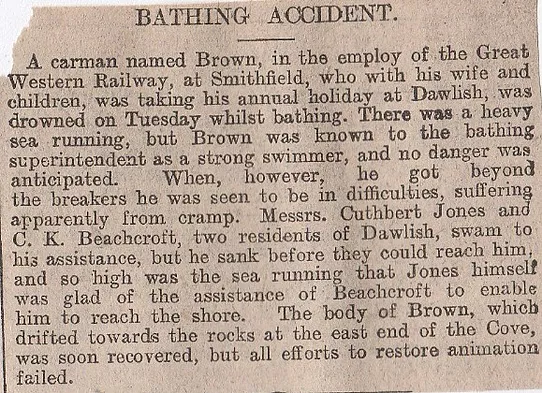
13/ Plymouth Suicide Letter, July 1886
William George Oliver was going out with a young girl called Emma Jenkins when a week ago she broke off the engagement. William was livid, so went to the house at Wolsdon Street and tried to talk her out of it. She was unrepentant, so he fired three times at her with a revolver. He ran for it and then shot himself, leaving a suicide note in his pocket. It read:
“I know you will be grieved to know that I Have done this wretched act, for you know I and Emma Jenkins have been keeping company for about three years, and now the engagement is broken off. I have brought a revolver to shoot both as soon as I get a chance. Rather than see her walking with others I will die. God has said that the murderer shall not enter the Kingdom of Heaven. Oh, how I do pray that God will forgive me. I have brought it on myself, for I have been a wretch to the one I love. She spoiled me in the beginning. She should have crushed my temper, and this would not have happened. Let me give my brother’s a little advice, not to treat their women as I have done, but do all that lies in their power to please them. P.S. Please when I am buried put this likeness in the coffin with me-my own and hers. Love is my mistake in life, and if she don’t have what I have in my pocket, may she take warning, and not trifle with anyone’s temper, for it is dangerous to both. If I should not kill her, but kill myself, ask her to go to my funeral, and place some ivy leaves on my coffin. Tell her to keep up her spirits, and not grieve about it, for I forgive her what she has done for me. God Bless her and help her to go through life better than what I have done. You can have this likeness copied. Goodbye and goodbye”.
14/ Wellington Murder, January 30th, 1885

Wellington Murder, February 4th, 1885
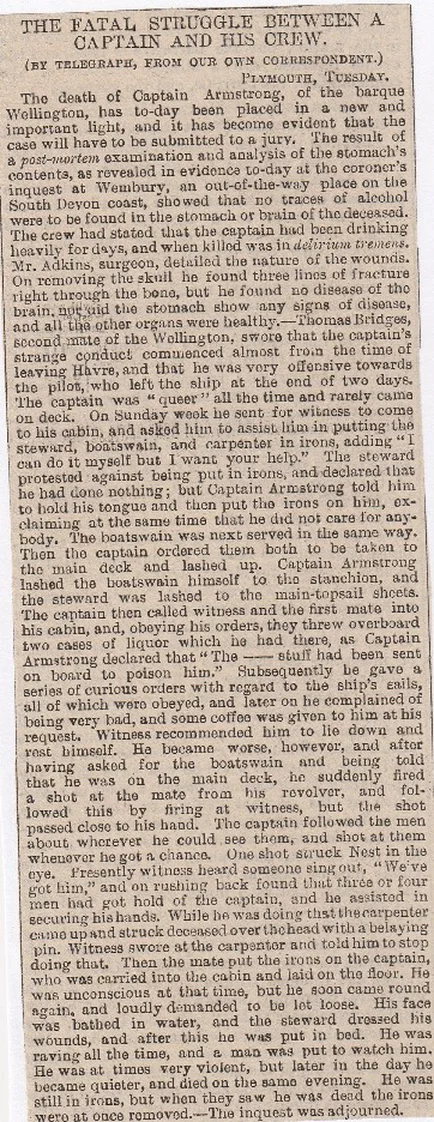
Wellington Murder, February 7th, 1885
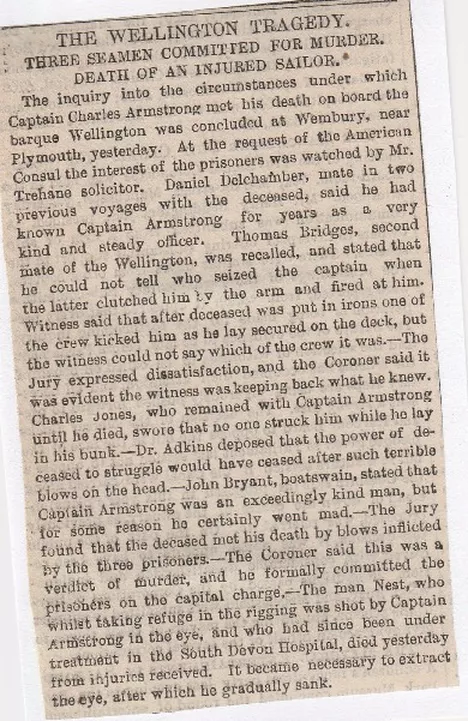
15/ Bideford, November 1884 (Skeletons Unearthed)
While building work was being carried out at some cottages, near to the Union Workhouse, two skeletons were dug up, only two feet from the surface. They were adults not advanced in life, as teeth were in near perfect condition. Unusually they lay on top of each other and buried in quicklime. One skeleton was five feet eight inches tall, the other five feet five, with the latter having a larger skull. No sign of a coffin and the positioning seems to be hurried and careless. A medical gentleman examined them and said they have not been there more than twenty years or so. About fifty years ago, a farmer was rumoured to have been murdered and thirty years ago a young lad named Oatway went missing and was never seen again. A gravedigger named George Harding said the digging was done by an amateur.
16/ St James’s Church, Exeter, April 1907 (Haunted Church)
St James’s Church in Exeter is supposed to be haunted. Weird sounds and tapping are heard in various parts of the building, just before morning and evening services. It has been described as “chanting of Psalms”. The voices are heard all over the place and efforts to solve the mystery have proved fruitless. (Did it stop? Church still there?)
17/ Exmouth/Topsham, August 1892
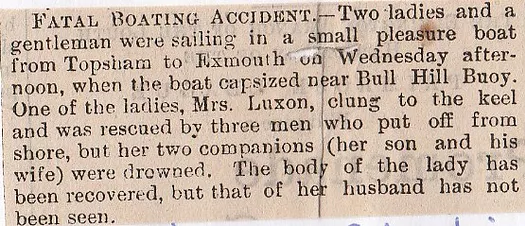
18/ Plymouth, March 1906 (Fatal Experiment)
This would never happen today as Health and safety regulations would stop it, but they stopped conkers and Blue Tac in schools as well! Emma Rowe, a fifteen-year-old pupil at the secondary school was doing an experiment testing the strength of caustic soda. The young girl had to drain the liquid by suction into a tube, but she swallowed some. She was given antidotes and placed under medical care but died in great agony a few days later. Apparently, the Board of Education had sanctioned this experiment and was perfectly normal.
19/ Devonport Station, August 1894 (Amazing Coincidence)
A clerk from Wandsworth by the name of William Moses left Waterloo station on a train bound for Devonport. As the train was pulling in to Devonport he was found in a compartment in a dying condition and died shortly after. Here’s the coincidence-his father died at the same station about three years ago and when Mr Mose’s pockets were checked, they found his father’s death certificate on him, which ultimately led to his identification.
20/ Newton Abbot Murder, November 1896
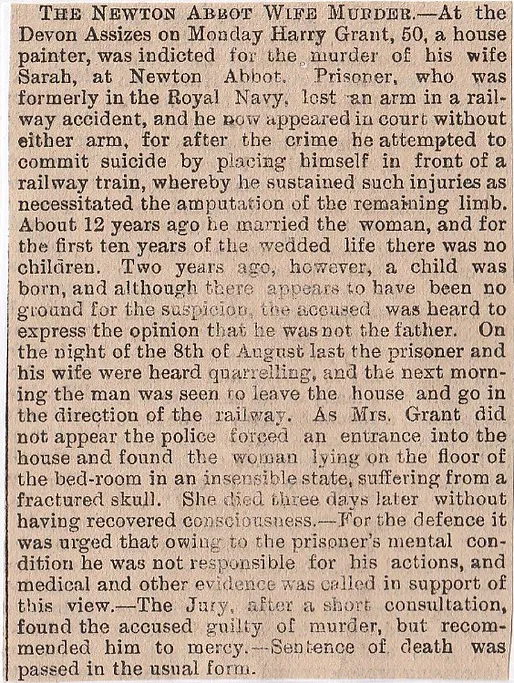
21/ Lake Hill, Barnstaple, December 1906 (Murder/Suicide)
Lydia Brown was found by the roadside with her throat cut and stab wounds in her chest. A small boy witnessed the murder and ran to town to tell the police. They went to the scene and a man was seen running from the murder spot and a dead male was discovered on the railway, a supposed suicide. After all this commotion, evidence was given to police about a man and his girlfriend who were savagely attacked and stabbed by a “wild-looking man”, near Lake Hill. The suicide was John Ash, a twenty-one-year-old local man whose jealousy got the better of him, hence stabbing his girlfriend, Lydia Brown. The couple had lived in Lake near Barnstaple with Ash’s parent’s, but for the last couple of month’s she lived in Barnstaple with a relative of hers. It seems that the relationship had cooled off, but he wouldn’t leave her alone but asked for a meeting. During this meeting he slit her throat then rushed off, passing William Dean and his girlfriend. Dean asked what the matter was and he attacked him with the knife. Ash then went to the railway line and placed himself on the track and let an engine run over him. Further searching revealed a note on Ash’s mangled body, which read:
“Goodbye Mother, Father, Flo, Jim, Willie and George. Give Bill my guns and watch. Well, Mother, I could not die without Liddie. The poor maid was good to me, but it is all over now. God has forgiven me for my sin. Tonight I stabbed her because she forsook me.”
22/ Plymouth Suicide, September 1894
Albert Cummings, a thirty-three-year-old carpenter was found by two children whilst picking berries, with two huge gashes on his throat and dead as a dodo. He had been missing from home for four or five days and he wasn’t robbed and murdered because he had money and a silver watch still on his person. He left a widow and four kids and the verdict was the common one in cases like this, “Suicide whilst temporarily insane”.
23/ Stoke Damarel Manor Death, December 1885 (See No.40.)
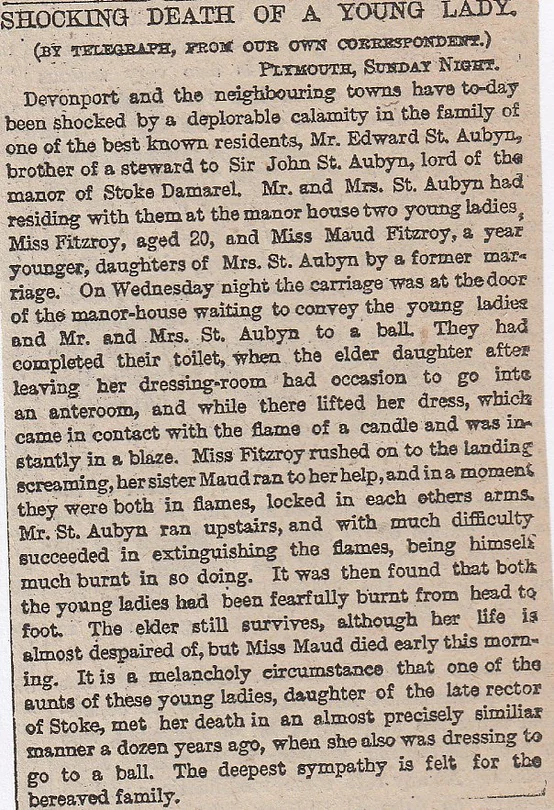
24/ Luffincott Rectory, June 1907 (Haunted Rectory)
The rectory at Luffincott is reputed to be haunted by the ghost of a former vicar called Parker.The present rector saw the apparition and fled the building, leaving furniture and contents behind. Midnight vigils have taken place there and parties spend the night hoping to spot the ghost. They have left behind rubbish and empty bottles and have vandalised the piano, smashing it to pieces and also the mantelpiece. The chairs, shutters and panels were torn off and used for firewood. Five officers from the Plymouth Garrison stayed there but they saw or heard nothing. The Bishop of Exeter has had enough of these shenanigans and declared the benfice void.
25/ Athenaeum Street, Plymouth, January 1894 (Human Remains)
Workmen were digging on Athenaeum Street, working on the sewers, when they came across some human bones. Further excavations revealed several skulls as well, which were in good condition. Tongues started to wag but the explanation was far more mundane than people had hoped for. They were the bones of dead French prisoners who passed away while at Mill Bay Barracks, known as a French prison. They were found four feet from the surface but will be re-interred immediately. (Re-interred where?)
26/ Keyham Factory Fatality, Devonport, April 1899
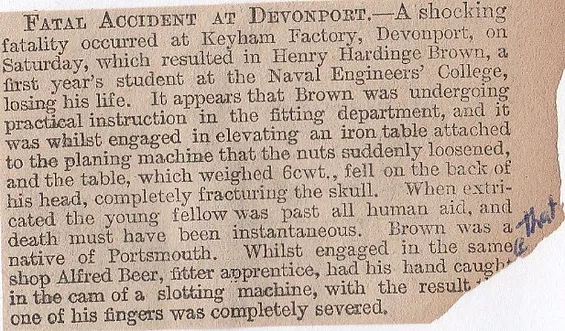
27/ Ashburton Mill Accident, April 1832
A sixty-year-old man named Jewell, worked in a bark-mill, powered by water and while he fed bark into the machinery, the cogs etc. stopped, so he pushed it in with his hand. You know what’s coming! His arm and hand were churned up in the machinery and despite his plea’s for help, it took a while to get him free. His arm had literally been mashed to a pulp and his words to the rescuers were, “cut away my smock frock and all will be well”. Jewell was taken home to recuperate but he died a week later. The strange thing is there was a deja vu moment the day before when he caught his thumb in the workings and a fellow colleague said: “Suppose it had caught your hand?”. His reply was ” Then it would have pulled it off! ”
28/ Stonehouse Infanticide, December 1885 (Plymouth)
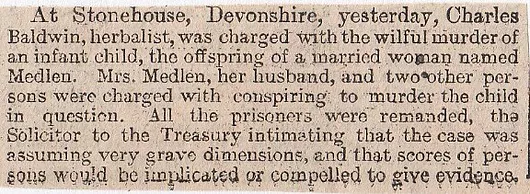
29/ Royal Artillery Camp Fatal Explosion, Okehampton, August 1901
The range officer at the Royal Artillery Camp at Okehampton, while inspecting the Dartmoor Ranges prior to an exercise, found three dead men. They were Sergeant Bleakley, R.F.A., ex-Sergeant Vanstone and P.C. Hall, both of Devon Constabulary. They had died from an explosion of Lyddite (explosive used in Boer War). They had been handling a live shell when somehow it went off. These three men were trying to find people who were stealing metal from the ranges. It turns out that Vanstone found the unexploded shell buried near Yes Tor on Dartmoor and with the other two went to unearth the bomb. Vanstone had no hands and a hole in his stomach, Hall had his arms and his head blown off and Bleakley was blown to smithereens, only his scalp and hair and a boot with a foot in it was left. This evidence suggests that Bleakley took the brunt of the blast, of a forty-pound lyddite shell.
30/ Slapton Sands, August 1910 (Missing Brothers)
The name will ring a bell with a few people, because it was here in April 1944, that 750 American soldiers were killed in a rehearsal for D-Day landings. German E-boats fired on them while they were unaware of anything untoward happening. It was like shooting fish in a barrel, and the other sad statistic is that there were no German casualties in response, so they never fired back. This story is of two brothers, William and Richard Downing, who went swimming while visiting their father at Slapton. The father got worried when they didn’t turn up and he went down to Slapton Sands and found their clothes, but not their bodies. (Bodies ever recovered?)
31/ Dartmoor Prison Fatality, Princetown, May 1885
This one resonates with me because I have epilepsy, but you’re not allowed to serve in the military, so it must have been a first and only seizure.
Captain Kemmis, governor of Dartmoor Prison near Princetown, went up to dress for dinner and when he didn’t reply to her requests, she went in and found him sat in an armchair, dead. Medical men pronounced his death to be from epilepsy.
32/ Plymouth, November 1885 (Bigamist Vicar?)
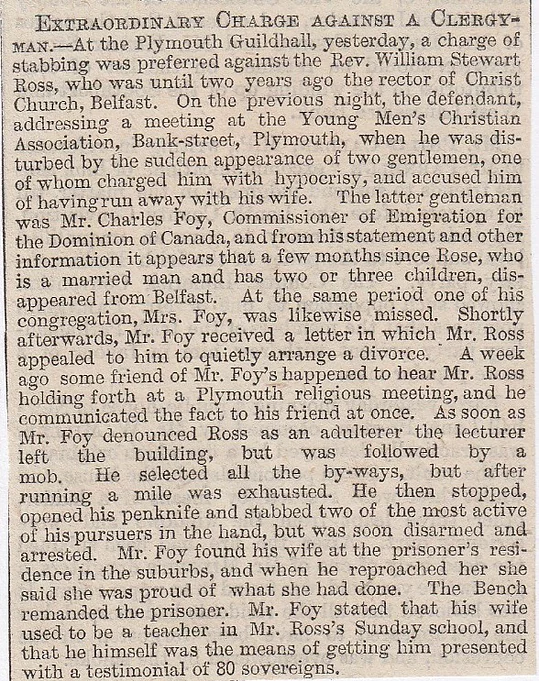
33/ Rockbeare Suicide, June 1853
Henry Havill only twelve-years-old, hung himself from an elm tree at Rockbeare, Devon. The boy did gardening work for the Rev. J.Elliott, and he slept there occasionally. He left for work one day and said he be home later that day, but when he didn’t come back the father presumed he was staying at the Reverend’s house. The next day there was no sign still and on the third day he asked a servant but was told he hadn’t been at all. Searching the property they found him hanging in a tree by his handkerchief, with the wound definitely self-inflicted. His brother hung himself a few months ago and it is thought he would join him, by committing suicide.
34/ Kingsbridge Road Station, near Kingsbridge, May 1885
A shocking accident occurred near Kingsbridge Road Station on the South Devon Railway. A seaman named West lost his hat from a train in which he had travelled from Plymouth, and while proceeding down the line after it, he was struck by a goods train and killed on the spot, with both his arms and a leg being cut off.
35/ Rockham Bay near Ilfracombe, August 1899
The body of Lionel Hugh Broad, a Croydon accountant, who was staying at Castle Rock, Morthoe, was found at the bottom of a cliff at Rockham Bay near Bull Point Lighthouse. The alarm was raised when he failed to return for dinner and the search party reckoned that he fell from the 300-foot cliff by accident. His head was shattered and he had a wound in his back.
36/ Exeter Lovers Drowned, October 1885
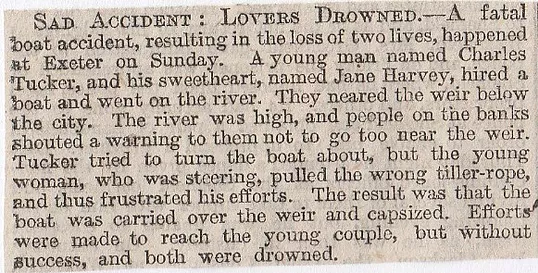
37/ Broadclyst near Exeter, September 1874 (Headless Corpse)
A lad was nut gathering in some woods at Broadclyst when he found a headless body of a man. On looking further, he saw the head in some bushes. There was a handkerchief tied to a tree and it is presumed that he hung himself, then as time ticked on decomposition took hold and the decaying flesh separated. A bag and some papers were nearby and they suggest he was a foreigner, a Belgian in fact, and the passport belonged to Salom Capelle, which is supposed to be the dead man.
38/ Plymouth Railway Fatality, November 1885
Mr George Heard, a licensed victualler from Plymouth, met a terrible death when he tripped over an embankment sixty feet high on the Tavistock line and was cut to shreds by an approaching train as he lay across the rails.
39/ Exeter, May 1849 (Real Culprit Found)
A couple of years ago a parcel went missing at Exeter Post Office. The banknote inside was passed on by a person who resembled a brother of a clerk, so immediately suspicion focused on him. He was sacked from his job, with this cloud hanging over him. However, his father was that overcome with the whole situation that he committed suicide and for that time the family suffered disgrace and poverty. The real culprit was found in the last assizes at Exeter and was a postman named Harrup, who confessed to the crime and was sentenced to transportation.
40/ Stoke Damarel Manor, December 1885 (Inquest) (See No.23)
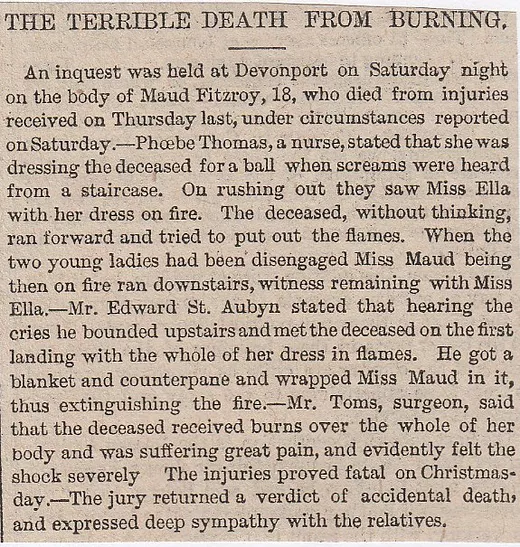
41/ Torquay, (Body in Cellar), December 1885
Auctioneers were moving furniture and boxes around Springfield House, which was occupied by Mrs Sutton and her mother when they found a packing case. They checked to see if it was empty and inside was a coffin. When that was prized open the body of a three-year-old boy was left inside. The Sutton’s claim that the boy died on a recent trip to America, but as to why it was in a case in a cellar is unclear.
42/ Warcombe Farm Murder/Suicide, near Kingsbridge, June 1904
Mr Hubert Baker owns Warcombe Farm and is well liked in the locality. When a gardener heard a gunshot at about seven o’clock, he went to the place he heard it coming from and saw the body of Mr Baker, with a bullet in his head. As the body was being taken to the farm, two more shots were heard and in the same field was the body of Albert Corner, a young lad in Baker’s employ. By his side were a walking stick and the gun and the reason for him doing this was because he had been sacked. Baker had given him a week’s money and told him to leave the premises. Corner wanted revenge and lay in wait for Baker to pass him in the field while seeing to cattle. He lay there until he could see him approaching, then jumped out and shot him in the shoulder, and then Baker tried to run to the farm but Corner followed and eventually shot him in the head. Corner knowing the police would put two and two together, shot himself in the face, blowing part of it away. He remained alive, so he put a stick in the trigger and again pointing to his head, pressed the trigger with his foot, this time it worked.
43/ Royal Citadel Death, Plymouth, August 1885
Two privates of the Royal Warwickshire Regiment went on the ramparts of the citadel at Plymouth and lay down to sleep on the grass. Soon after, one of them, George Lockey, turned over and rolling down the slope was dashed upon the rocks below and was instantly killed. He had been reported for being drunk the night before and had been ordered under arrest.
44/ Plympton Vicar Vanishes, April 1885
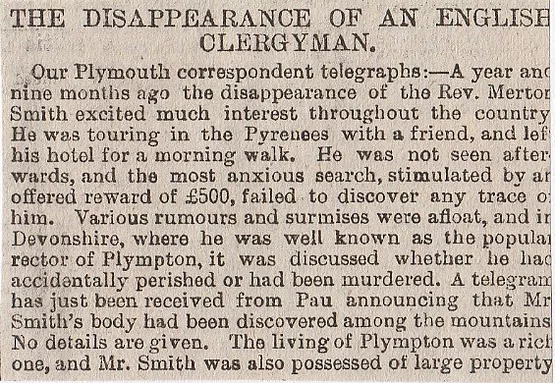
45/ Marwood Suicide, North Devon, April 1832
A 24-year-old cabinet maker from Marwood, Richard Tucker hung himself, because of love and jealousy. He had been seeing a local girl for some time, but she had recently turned her attention to another young stud. As was customary in the village they had a dance at the local public-house, so he went along to see if she was there. She was there and she was dancing with the other bloke he’d heard about, plus she gave him a real mouthful of abuse. A few hours passed and a party-goer went into the stable to get his horse but saw Tucker suspended from a beam. Verdict “Temporary Insanity.”
46/ Ilfracombe Secret Signalling, July 1900
Two men were found in possession of a secret naval signalling code. A coastguard was interrogated by the two, as to signals to distinguish foreign warships. One had a book and the coastguard was surprised to see it was a copy of the secret code. He reported it to officials and the two men were followed on board a Bristol steamer, where they were arrested and the code confiscated from them.
47/ Hartland, March 1863 (63-year-old Suicide)
Mr E.Hockin, an auctioneer at Hartland, was found hanging by the neck to a nail in his own house. Though sixty-three, he had been seeing a woman but she had dumped him. The lady had gone to London to get out the way, but this made things worse and he ended up committing suicide.
48/ Tiverton Mystery, February 1885
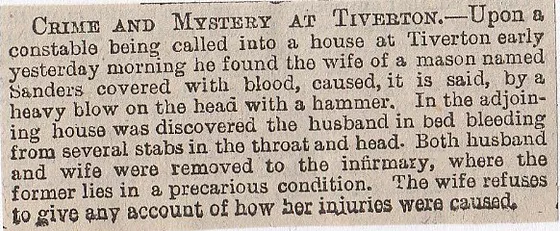
49/ Theatre Royal Fire, Exeter, September 1887
At Exeter’s newly opened Theatre Royal, the crowd grew restless, thanks to a poor performance and a host of mishaps. They wanted a refund by the sound of it, for an amateurish production, then howls and jeers forced the curtain to come down. Unfortunately, the gas lights lit the curtain and a huge fire spread quickly. There was a mass panic and around 130-160 persons never made the exits, and the fire was so intense that most of the bodies were burned to a crisp, so much so that relatives couldn’t identify them either. The exact number of deaths is still unknown to this day.
50/ Royal Albert Hospital Suicide, Devonport, October 1889
Lieutenant Francis E.J.Tottenham, the ex- navigating officer of H.M.S.Curlew, had recently been staying at Thomas’s Hotel, Devonport, but then suffering from delirium he had been transferred to the Royal Albert Hospital. During his stay in the hospital, had shown violent tendencies and one morning at eleven a.m. he overpowered a nurse then leapt from a window, a fifty-foot drop. He fractured his skull and broke both legs, but died after an hour. He was thirty-five years old and not married.
51/ Plymouth Hoe, September 1850 (Child Suicide)
John Denham, a thirteen-year-old boy had just been told off by his Dad and told that he’d be having no dinner, he rushed out of the house and down to the Hoe, where he threw himself over the rocks and was drowned.
52/ Tiverton Boy Suicide, January 1865
The son of the grave-digger at Tiverton Cemetery, a lad of thirteen, killed himself by hanging himself in the dissenting chapel. He had been having fits recently and his mother had told him off for fighting with his brother, this tipped him over the edge.
53/ Devonport, May 1884 (Scene at a Funeral)
Charles Williams, a naval pensioner who committed suicide was meant to be buried, but a shocking scene ensued outside deceased’s house. A crowd of 800-1000 had gathered, with the sole objective of lynching the widow. She had been seeing the deceased while he married the first time and whom he married two week’s after she died. Policemen remembered that trouble brewed at the wedding and the locals had a long memory and a low tolerance for this type of behaviour. There was hollering and jeering all the way to the cemetery.
54/ Plymouth Fire, December 14th, 1885 (Looe St-Thirteen Dead)
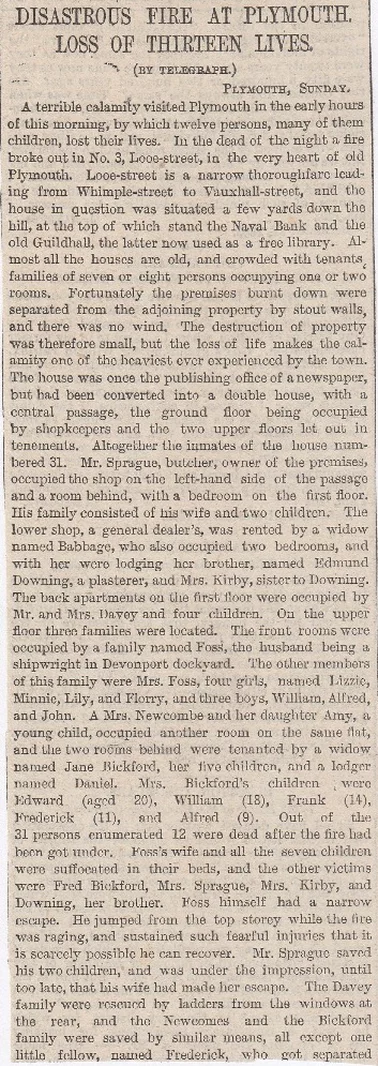
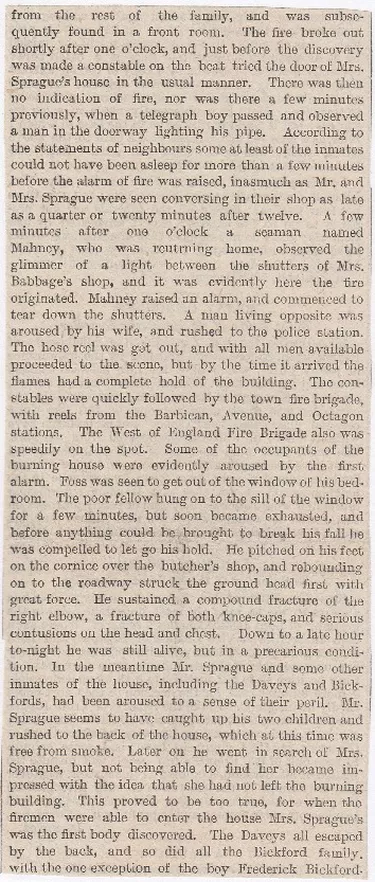
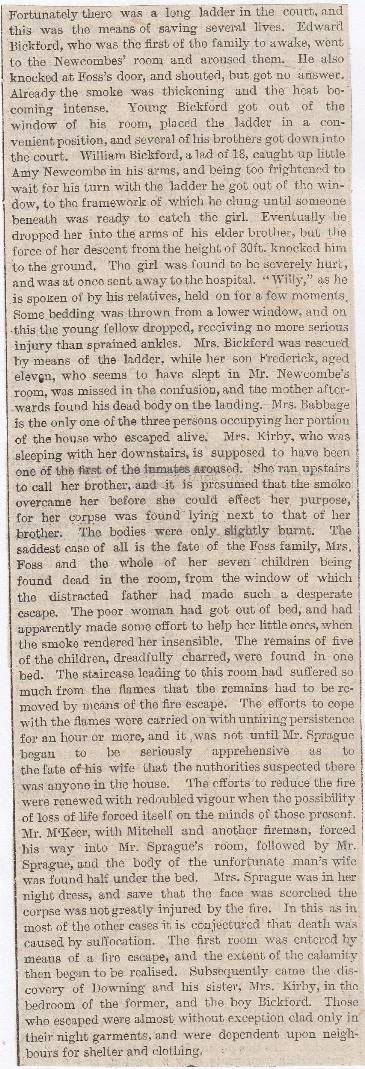
55/ Plymouth Fire, December 15th, 1885
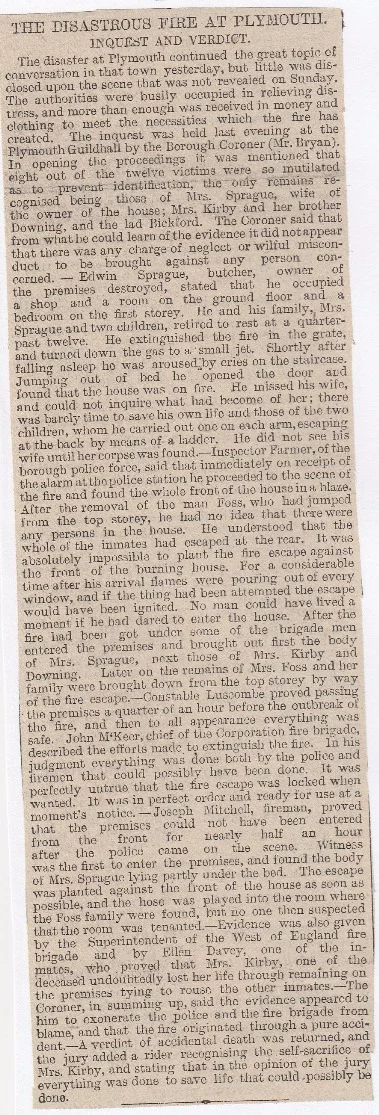
56/ Exeter Suicide, January 1862
The body of a young woman named Piper was found, and it was down to the treatment of her father that she did this. Everyone agreed about his brutality toward her and threatened to kill her. The deceased’s mother said, “My husband always treated her cruelly. When I told him what had happened, he said “I am glad of it, and if it is she who has drowned, I’d stay up and make the coffin. Now I shall be happy.” When she died an insurance company would pay out £8 11 shillings.
Police said that when she was found, he didn’t seem at all bothered, and he tried to get her earrings off her dead body. A juror threatened to throw him in the canal his daughter had just been fished out of. Jury’s Verdict-Found Drowned.
57/ Plymouth Cemetery Suicide, May 1864
In an open vault in Plymouth Cemetery, John Manicom committed suicide by cutting his throat with a razor. He entered the vault foremost, then hanging by the sides he must have dropped to the bottom, about eight feet. He took off his coat shirt and waistcoat, then slit himself in the neck. He had been suffering from depression for a while. (Which Vault?)
58/ Devon County Gaol Suicide, Exeter, October 1873
A young lad named Robert Harrison, who was serving fifteen months inside with hard labour at the Devon County Gaol for theft at a pawn-shop, committed suicide by hanging. He was part of a gang of thieves, which had virtually been the cause of crime in Exeter, by themselves. When they arrested him he had a flick-knife on him and told officers he’d rather be dead than serve time.
59/ Devon County Gaol Suicide, September 1856
An elderly man named William Aggett had been sent to Princetown, Dartmoor, to face trial for stealing. He thought he’d get off, but his son was sent down for a similar offence at this goal. He began to worry and this caused him to hang himself from a water-pipe in his cell. Aggett had one arm but skilfully managed to tie it across his stomach, with a handkerchief and also his legs. The rope was home-made from oakum. He had not dislocated his neck but choked himself instead, but it proved fatal.
60/ Barnstaple Glutton, December 1885

61/ Plymouth Murder/Suicide, August 1907
Mrs McLoughlin was separated from her husband and worked at the Albion Hotel. Her husband crept into the back of the building with a double-barrelled shotgun and waited for her to appear. The rest of the hotel heard two loud reports, they then ran to the still-room where Mrs McLoughlin lay in a pool of blood and with part of her head blown away. Next to the body was her husband, who had also blown his brains out. William James McLoughlin was charged with “Wilful Murder” and “Felo de Se”. The children stated that the father was a drunkard and a wife-beater, but grew so accustomed to his outbursts that they ignored him in the end.
62/ King’s Arms Hotel Suicide, Salcombe, May 1855
Mr Chapman, the landlord of the Kings Arms Hotel in Salcombe, committed suicide by jumping from a window. It was three stories high and it is amazing that he wasn’t killed instantly. He lingered for a couple of days, then finally died of his injuries.
63/ Newton Abbot Suicide, July 1879
Elizabeth Hurrell, thirty years old, went for a walk with her husband and kids. The husband left her alone for a few minutes and during this time she gave the door key and the baby to her eight-year-old son and told him to go home and wait for her. They did this, and she walked calmly into the river Teign and making no noise she went under. Everyone is at a loss to explain why she did it.
64/ Okehampton Death, March 1899
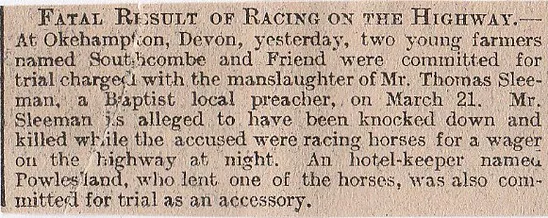
65/ Devonport, March 1845 (Soldiers Suicide)
A sound of a gunshot alerted military staff to a sergeant’s mess-room at Devonport Barracks. Two soldiers found him in the room with a gunshot wound to the face. He ‘d been with two others in the room earlier on and he left to go to an adjoining apartment, where he tied his lace to his big toe, then fastened it to the trigger and then pulled it. The contents blew the back of head away. He was named as William Davidson, aged twenty-six.
66/ Cockermouth Sunday School Deaths, March 1832
The Sunday School at Cockermouth saw a frightful accident that resulted in the deaths of two children. Around four-hundred children were in the upper room, for the purpose of hymn-singing. When they left the room, the sheer weight of the youngsters passing through, caused the floor-beam to give way and dozens fell. Also, the supporting wall collapsed and several were buried under rubble. Two were killed outright and several injured.
67/ Appledore Drownings, June 1885
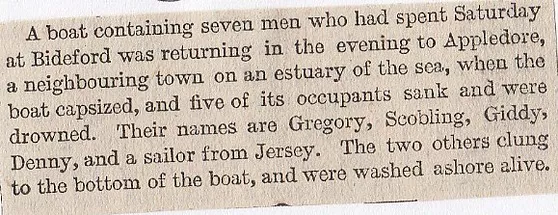
68/ Dawlish Cliff Accident, September 1st, 1885

69/ Dawlish Cliff Accident, September 2nd, 1885
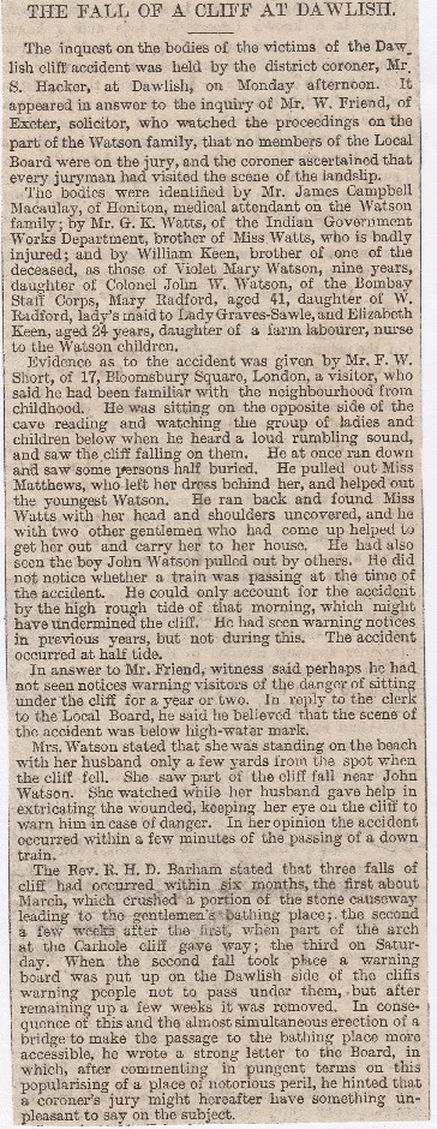
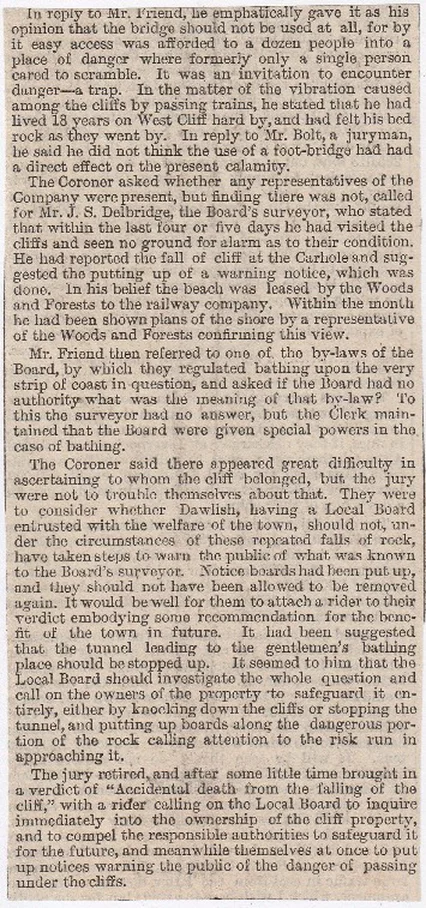
70/ Exeter Poker Suicide, September 1859
A blacksmith from Exeter called Woodgate killed himself in a novel way. He ran a red-hot poker into his body. There was a witness named Searle who just walked off, telling Mr Brown that he just saw a man shove a poker into himself. Brown went to see, but Woodgate was trying it again! Brown caught hold of him and saw four burned wounds in the abdomen. Obviously, Woodgate couldn’t have survived that and he died a couple of days after.
71/ Stoke Suicide, near Devonport, January 1878
Persons passing in front of a villa in Stoke near Devonport saw the corpse of a man hanging from a tree outside the house. The body was cut down and was identified as that of retired tradesman named Keen, who wanted to kill himself in full view of the public. (Is the house still there?)
72/ Lapford, (Reverend John Arundel Radford)
I read somewhere about this unconventional vicar, who used to be a boxer and a wrestler. He was infamous for hardly anyone turning up to his congregations, it was him, the clerk, the sexton and a couple of old locals. He was also a fan of hanging about the city late at night and having a good time. He earned the nickname “Parson Jack”. Also, there is a memorial in the churchyard, which says he murdered his curate but was acquitted by the jury who were scared of sentencing a vicar to death. There was also the curse, that if he wasn’t buried in Lapford church, he’ come back and haunt them. (Is he buried there?)
73/ Plymouth Sound Fatality, May 1885
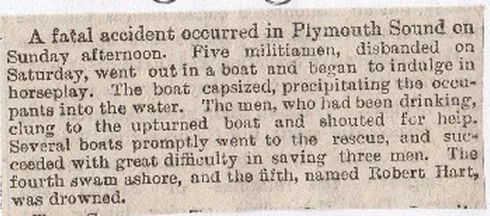
74/ Devonport, December 1881 (Drowned in Vat of Beer)
George Osborne (no not the Ex-Chancellor!), a middle-aged bloke from Plymouth and a drayman by trade, was found drowned in a vat of beer. This was an act of suicide and what a way to go! Osborne left his hat and watch by the side. He was in court a few weeks ago on the charge of attempted suicide by cutting his throat, but this time he thought of a way to do it, one that would be memorable to all.
75/ Livermead Death, April 1892

76/ Langford near Exeter, Accidental Death, August 1870 (Mrs Bastin was shot also)
77/ Torquay Fatalities, September 1870
It is reported from Torquay that at seven o’clock yesterday morning the “traveller”, by which blocks of stone are lowered into the sea, at the extreme end of the new breakwater at Torquay, toppled over, carrying with it a portion of staging and some of the workmen. Two workmen named Strawbridge and Veale were drowned, and two others were so badly injured they were taken to the infirmary. The bodies of the two drowned men were recovered an hour after the horrific accident occurred.
78/ Buckland Monachorum Child Murder, August 1870.
79/ Newton St Cyres (Gun Fatality) October 1870
A shocking accident occurred at Newton St Cyres, Devon, on Friday. Mr Passmore, a farmer, was preparing to go out for a day’s shooting with two friends. While drawing the charge from the gun, preparatory to cleaning the weapon, the gun exploded, and the charge entered the forehead, killing him instantly.
80/ Clovelly Boat Death, November 1870
As a fishing boat named Jim, was on Friday, out in a heavy sea off Clovelly, it suddenly foundered, and the crew, consisting of father and son, were seen clinging to the masts and spars. The lifeboat was launched as soon as possible, but in the meantime, a man named John Whitefield, who was fishing in the vicinity of the accident, cut away his own nets and proceeded to the spot. He succeeded in rescuing the father, who was transferred to the lifeboat, but the younger man was drowned before aid arrived.
81/ Policeman Attacked in Barnstaple, November 1870 (Did P.C. Jones survive?)
82/ Dartmoor Fatality, January 1866. (Island of Rock)
83/ Charlotte Winsor (Baby Farmer/ Child Murderess) February 14th, 1866.
May 24th, 1866
A conditional pardon was yesterday issued from the Home Office commuting the capital sentence passed upon Charlotte Winsor, to one of penal servitude (hard labour)
84/ Fatal Mine Accident, Horrabridge. May 1866 (Furze Hill Wood Mine)
85/ Drowning near Red Cliff Castle, Paignton. June 1866
86/ Execution of Husband Poisoner, Mary Ann Ashford, Exeter County Gaol. March 1866
87/ Devonport Murder? March 1866
88/ Weird Death at Paignton, January 1867
A fatal accident occurred at Paignton on Wednesday. Mrs Pethebridge, the wife of a farmer of Marldon, finding her husband late on his return from Newton Market, feared that something had happened to him. She directed a servant to put the horse in the trap and then drove off towards Newton. She had not got a couple of miles when she met her husband on horseback. The horses, knowing each other, stopped suddenly, and Mr Petherbridge, not being very alert and slightly drowsy, was pitched over the horse’s head, and killed on the spot.
89/ Burnt to Death, Millbay, Plymouth. December 1866 (Burnt in boiling tar)
90/ Devonport Murder/Suicide, March 1867
91/ Fatal Explosion at Stoke Canon, February 1867
92/ Cruelty at Devon Lunatic Asylum, January 1867.
93/ Vicars Suicide in Exeter Asylum, August 1903.
The Reverend Francis John Bleasby, of Tiverton, died at Exeter Asylum on Sunday. On Wednesday week deceased took a strong narcotic and on Friday was certified as a pauper lunatic. The Reverend gentleman, who was forty-eight years of age and unmarried, had latterly developed eccentricities in speech and conduct, and left letters stating that the strain and burden of his life were too much for him.
94/ Fatal Boat Accident at Devonport, October 1903. (The Hamoaze)
95/ Murder of a Policeman, Plymouth. September 5th, 1903.
Early on Sunday morning, Police Constable Edwin Wilce was called to No.6, Castle Street, Barbican, Plymouth, by screams for help. He entered the house, and a little later his dead body was discovered on the doorstep. Subsequently, Sergeant Rogers, of the Plymouth Police, arrested a merchant sailor on a charge of murdering Wilce, who leaves a widow and children. The deceased was forty years of age and had been in the police force for eighteen years. The deceased constable bears no outward marks of violence, and fatal injury being internal.
Saturday, November 14th, 1903 (The Trial and Verdict)
96/ Three Drown near Paignton, September 1904.
A boating accident, involving the loss of three lives, occurred in a heavy easterly sea at Torbay, on Sunday night. At dusk, three Brixham fishermen, James McLean, twenty-four, Edward Cridland, sixteen, and sixteen-year-old George Memery, arrived at the pier at Torquay to return in a small sailing boat to Brixham, from which place they arrived in the afternoon. The coastguards stationed at the pier impressed upon the young fellows the great danger that attended their crossing the bay in such a sea, and advised them to postpone the tip. The advice was not taken. After the Brixham lifeboat had been despatched in search of the empty boat with a hole in it, was washed ashore on Paignton beach.
97/ Paignton Child Murder, July 1904. (Corpse in a Tin Box)
98/ Fatal Boat Collision in the Hamoaze, March 1904. (Hamoaze- is a river, part of the Tamar. Apologies for missing a bit at the bottom. Overzealous with the scissors!)
99/ The Babbacombe Murder (Hangman Tells Of His Experience) April 1905
100/ Suicide of Suspected Murderer, Hatherleigh. May 1905
101/ Plymouth Schoolgirl’s Fatal Experiment, March 1906.
102/ Belstone Housekeeper’s Suicide (Near Okehampton) April 1906
A sad tragedy occurred early on Saturday on Dartmoor. The housekeeper to the rector of Belstone, a village three miles from Okehampton, who had been nursing her employer, who was stricken with paralysis. The strain of her duties and her apprehension of his death, it is thought, caused her to steal out of the sick room in the night to an outhouse, where she cut her throat from ear to ear. The main arteries were severed, and death must have been instantaneous.
103/ Death on Hood Bridge (now Dart Bridge near Staverton Station) August 1906.
104/ Dartmouth Borough Surveyor’s Suicide, November 1906.
105/ Girl Dressed as Boy Drowns Herself, Teignmouth. November 1906
106/ Plymouth Hotel Murder/Suicide. August 10th, 1907
Saturday, August 10th, 1907 (Verdict)
A Plymouth jury on Wednesday found that Mary Ann MacLoughlan, who was shot dead on Tuesday in a local hotel where she was employed as a charwoman, was murdered by her husband, William James MacLoughlan, who afterwards shot himself, the verdict in the latter being “felo de se”.
107/ A Message in a Bottle, Teignmouth. July 1907.
A Teignmouth fisherman picked up a bottle on the beach on Sunday containing a message which purported to be signed by the captain of the ship “Mayflower”. The message was dated, 20th of July, 1906, and stated that the vessel had been on fire for two days, and was burned to the water’s edge. The ship was described as loaded with grain, and the captain sailed from North Shields.

